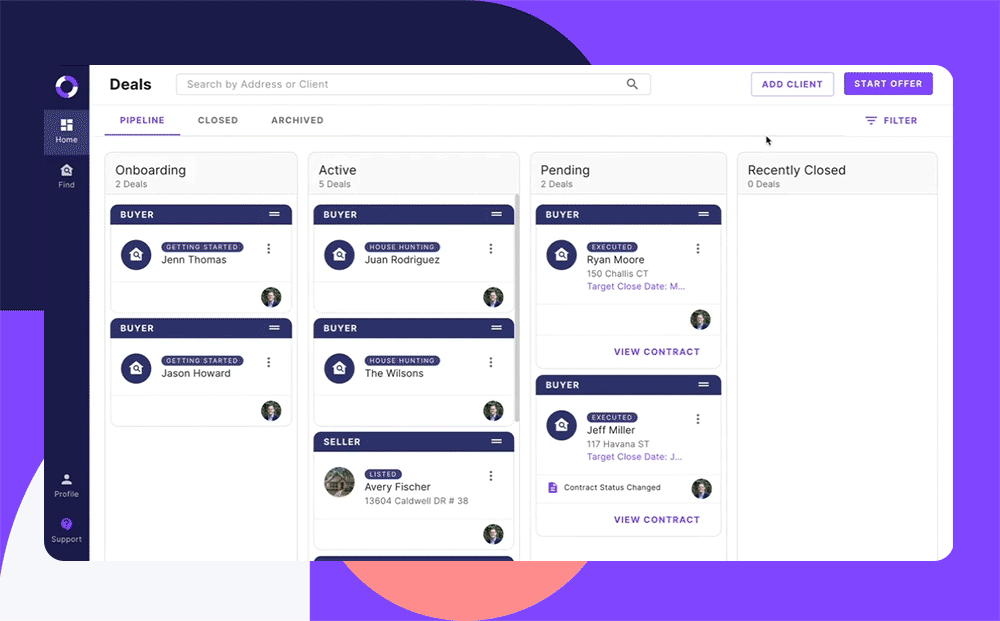
How to become a real estate agent in Texas

Thinking about becoming a real estate agent in Texas? In this guide, we’ll walk through everything you need to know to become a licensed real estate agent in the state of Texas. From eligibility requirements to license costs to finding a broker to sponsor you, you’ll know exactly what you need to do next to start your career journey in real estate.
Requirements for becoming a Texas real estate agent
The first step to beginning your real estate career in Texas? Determining whether you meet the eligibility requirements to apply for your license. To be eligible to apply for a Texas real estate sales license, you must meet the following requirements:
- You are a U.S. citizen or lawfully admitted alien (DACA recipient does not qualify as a lawfully admitted alien)
- You are 18 years or older
- You are a legal resident of Texas
- You meet the TREC qualifications for honesty, trustworthiness, and integrity—this is determined by the results of your background check; however, you can also request a Fitness Determination before applying for your license to see if you meet these requirements
What is a Fitness Determination?
Certain criminal offenses, unpaid judgments, disciplinary actions, or unlicensed activity you may have performed in the past may disqualify you from getting your real estate license. Before you go through the entire application and exam process, you can request a Fitness Determination to see if you qualify to get your license.
If you’re concerned about something that may come up during your background check, requesting a Fitness Determination may save you money and time in the long run. To complete a Fitness Determination, you will need to pay the non-refundable $52 fee using TREC’s online license portal. Once you’ve paid the fee, within 5 business days, you’ll receive an email with the Fitness Determination form and instructions on how to submit it.
How much does it cost to become a licensed real estate agent in Texas?
If you’re looking to get your Texas real estate license, you’re probably wondering how much it will cost you. While there are various fees and dues associated with being a licensed real estate agent, for the purposes of this guide, we’ll focus on the initial upfront costs need to apply and obtain your real estate sales agent license.
Texas real estate license costs
Initial application fees
The total cost of the initial application fee for becoming a Texas real estate agent is $185.00. The is fee is payable to TREC and will be due when you submit your application. Once you are licensed, it is good for two years, at which point you’ll have to renew your license for a fee. The following costs make up the total application fee:
- TREC application fee: $150.00
- Texas online fee: $5.00
- Real Estate Center at Texas A&M fee: $20.00
- Recovery fund fee: $10.00
Course fees: Between $400-$500 (varies depending on course provider)
Exam fee: $43.00 (paid to the exam provider)
Other fees
- Fingerprint fee: $38.25 (paid to IDEMIA)
- Fitness determination: $52.00 (optional)
All in all, the initial cost for applying and obtaining a real estate sales agent license in Texas will generally cost you about $700 to $850.
Now that you understand the eligibility requirements and costs associated with getting your license, let’s see exactly what steps you need to take to become a licensed Texas real estate agent.
Steps to becoming a real estate agent in Texas
Ready to be come a real estate agent? Here are the steps you’ll need to take to become a licensed agent in the state of Texas:
1. Complete real estate course requirements
In order to submit an application to become a licensed real estate sales agent in Texas, you’ll first need to complete the required real estate courses. The Texas Real Estate Commission (TREC) requires 180 classroom hours of real estate courses. Below are the required courses with each requiring 30 classroom hours:
- Principles of Real Estate I
- Principles of Real Estate
- Law of Agency
- Law of Contracts
- Promulgated Contract Forms
- Real Estate Finance
There are several education providers who teach these courses. You can search for an approved education provider on the TREC website. If you’ve previously taken any of the courses at an accredited university for academic credit, you may satisfy the requirement for that course. You can submit your transcript to TREC for to see if the course you took meets any of the above course requirements.
2. Get your fingerprints taken to complete your background check
To become a licensed real estate agent in Texas, you are legally required to complete a background check, which includes getting your fingerprints taken. In order to satisfy this requirement, your fingerprints must be on file with the Texas Department of Public Safety (DPS). Fingerprints on file with another agency are not recognized.
To start this process, you’ll first need to obtain your IdentoGO ID. IdentoGO is used by the Texas Department of Public Safety to collect and submit fingerprints to the FBI who is ultimately responsible for processing your fingerprints and conducting your background check. You can search for your IdentoGO ID on the TREC website. As a new applicant, you’ll simply need to provide your first name, last name, and date of birth. Once you have your IdentoGO ID, you can schedule your fingerprint appointment.
After your fingerprints have been taken, a background check will occur. You’ll be notified whether or not you’ve passed the background check. TREC will not issue you a license if you do not pass the background check.
3. Submit your sales agent application to TREC
Once you’ve completed your real estate education courses and passed the background check, you can submit your real estate sales agent application to TREC. This can easily be done online using their online licensing portal. You can sign up for an account and apply for your real estate license here. If you prefer, you can also apply my mail using the paper application.
At the time of submission, you must also pay the initial application fees for becoming a licensed real estate agent. The total initial application fee is $185.00. This cost includes the TREC application fee ($150.00), Texas online fee ($5.00), Real Estate Center at Texas A&M fee ($20.00), and the recovery fund fee ($10.00).
Once you submit your application, you will have one year to complete all the requirements needed to become a licensed agent including passing the exam.
4. Take the real estate exam
After you’ve submitted your application, it will be reviewed to ensure you meet all the requirements and you will be notified if you’re eligible to sit for the real estate exam. When you’re notified of your eligibility, you'll be provided with instructions on how schedule the exam with the exam administrator. TREC license exams are administered by PearsonVUE, a testing service company. Along with your notification, you will also receive the Candidate Handbook which includes information about the exam and study materials.
Here’s some answers to frequently asked questions about the Texas real estate exam:
How long is the Texas real estate exam?
You will have a total of 240 minutes or 4 hours to complete the exam. This includes both the state and national portions. The national portion of the real estate exam includes 85 questions that must be answered within 150 minutes or 2.5 hours. The state portion of the exam consists of 40 questions that must be completed in 90 minutes or 1.5 hours.
How much does the Texas real estate exam cost?
The fee for taking the Texas real estate exam is $43. This fee is paid to PearsonVUE.
When will I find out if I passed the exam?
Once you complete the real estate exam or when the exam time runs out, you will receive a score report with a “pass” or “fail” mark at the exam center. If you pass, TREC will email you a license document within 5-10 business days so long as you have also passed the background check.
What happens if I fail the Texas real estate exam?
You have three chances to pass both the state and national portions of the exam. If you fail, you’ll have to wait at least 24 hours before retaking the exam. You only need to retake the portion of the exam that you failed as long as it’s done so within one year of your application date.
If you fail the exam three times, you’ll be required to complete additional education before you’re able to retake the exam. If you failed both parts of the exam, you will need to take an additional 60 hours of classroom education. If you only fail one part of the exam, you’ll only need to take an additional 30 hours of real estate education.
How hard is the Texas real estate exam?
The overall pass rate for the Texas real estate exam based on data from education providers over the past two years is 61.25%. Given that, it’s fair to say passing the real estate exam isn’t necessarily easy. Preparation and practice is key. You can check out pass rates for TREC-approved education providers on the TREC website.
5. Find a broker to sponsor your license
Once you’ve met all the requirements above and passed the real estate exam, TREC will issue you an inactive license. In order to activate your license and work as a rela estate agent in Texas, you must be sponsored by an active Texas licensed broker. You can request sponsorship from a broker through TREC’s online license services portal. Once your request has been accepted, you’ll be issued an active license and you’ll officially be a licensed Texas real estate agent!
Frequently asked questions
Hopefully, we’ve answered most of your questions regarding what it takes to become a real estate agent in Texas. Just in case you have a few lingering questions, here are some answers to frequently asked questions by aspiring agents.
How much do real estate agents make in Texas?
According to the National Association of REALTORS®, the median gross income of REALTORS® nationally in 2020 was $43,330. As would be expected, REALTORS® with more experience had a higher median gross income. REALTORS® with 16+ years of experience had a median gross income of $75,000, whereas REALTORS® with two or less years of experience had a median gross income of $8,500. However, don’t let this number discourage you!
Becoming a successful agent may not be easy, but if you put in the time and effort, you can certainly make a good living. When you’re just getting started, you may not be making tons of money right off the bat, but as you grow your network, there are plenty of opportunities to increase your income. Fortunately, the Texas real estate market is growing rapidly with plenty of business available if you’re willing to work for it.
How long does it take to become a licensed real estate agent in Texas?
The answer to this question depends on several factors, but generally it can take anywhere from 6 to 8 months in total to get your Texas real estate license. This includes taking the required courses, sitting for the exam, and ultimately, getting your active license.
Completing the required real estate courses makes up the bulk of that time. If you opt for in-person classes, it will likely take several months to complete your coursework. In-person classes are typically held one or two days for a few hours each week. However, you can also enroll in full day classes that allow you to complete the courses faster. Online classes allow you to self-pace your learning, but generally the fastest you can complete the online classes is about a month, but this will depend on how much time you have each day to dedicate to completing the courses.
Once you’ve completed the required real estate courses, you can usually get your license within several weeks, assuming you pass the exam and find a broker to sponsor you. It’s worth noting that you have one year from your application date to successfully complete the required real estate courses and pass the exam.
We hope we’ve sufficiently prepared you to go forth and start your real estate journey!
Disclaimer: *The information provided in this article is meant for informational purposes only and is not intended to constitute legal, financial, tax, or insurance advice. Jointly encourages readers to contact their attorney or other advisors for advice regarding these matters.





